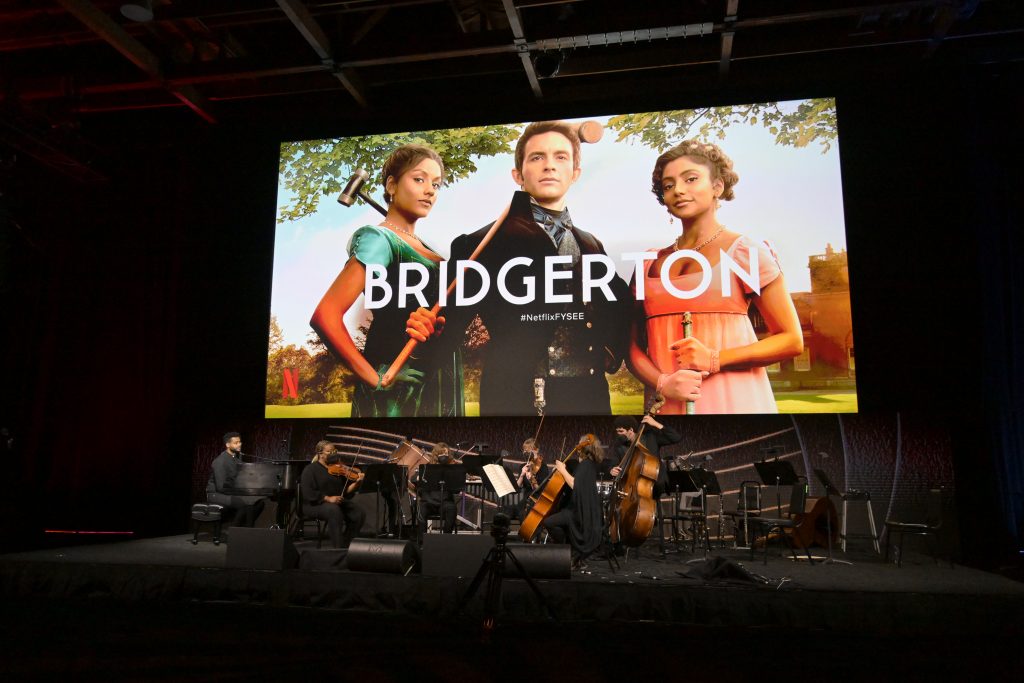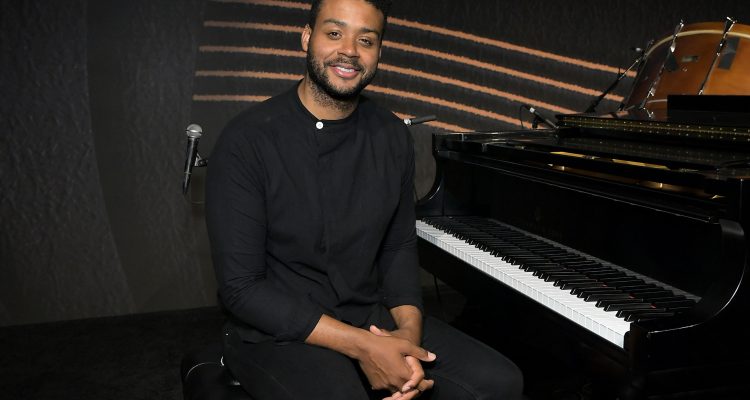Emmy award-winning composer Kris Bowers has become one of the most in-demand musicians in his field, and his work on Netflix’s regency drama Bridgerton has once again placed Bowers into the Emmy conversation.
The King Richard composer has recently created scores for several new television series, including Netflix’s Inventing Anna, HBO Max’s dystopian drama DMZ, and HBO’s We Own This City.
After receiving received two nominations for Bridgerton season one in 2021 (for score and main title theme), Bowers returns to the race with an impressive season two score that features new musical themes and gorgeous arrangements.
Bowers took the stage at Netflix’s Raleigh Studios a week ago to perform selected cues from season two for the press and Television Academy members in attendance. Bowers was masterful at the piano and shared details about his writing process and inspiration for his score.
“The thing I was most looking forward to doing with season two after the first was having the modern covers influence the way I wrote the score,” shares Bowers. “A lot of times in season one, I was looking at a piece of pop music to see if there was anything I could borrow, whether it was the beat or chord progression, so I decided to go further this season.”
In season two, the series shifted focus to Anthony Bridgerton and his contentious romance with the strong-willed Kate Sharma, played by Simone Ashley. Again, Bowers utilized modern pop songs such as Robyn’s “Dancing on my Own” and Alanis Morissette’s “You Outta Know” as inspiration for his orchestrations, which infuse the period world with a modern consciousness.
Bowers spoke with Awards Focus about the musical palette for Bridgerton season two, how he arranged his score for the live Netflix performance, and finishing his journey on Dear White People.

Awards Focus: How did working on the Academy award-winning film Green Book and being immersed in it helped you become the composer you are today?
Kris Bowers: The most significant part was being thrown into the fire. I mean, that was my first studio film and second narrative feature. I worked on a few documentaries before and a small indie feature, but to go on to something that large of a scale was like being thrown into deep water.
It was great to start with that because I feel, given my background and what I’m used to, every space I go into is pretty deep, even thinking back to Julliard. So starting on Green Book, on such a high-profile project, just felt like what I’m used to in terms of having a high demand for myself and what I want to turn out for a project.
Having that team of Mahershala and everybody else involved made me want to not be the weak link and ensure I was bringing the same energy and talent to the pool.
AF: Given the grand scale of Bridgerton’s production, from costumes and design to performances, musically, what did you want to achieve coming from season one into season two regarding the sound palette?
Bowers: I think a big part of it was trying to create new themes for some of the characters that were coming into this season since it was a new storyline. Although, a lot of the sound of the show remained like the instrumentation and approach.
The first step was coming up with the new themes for Anthony, Kate, and Penelope, now that we know she’s Lady Whistledown and looking at the two sides of her character. Eloise also gets a love story, so a few themes were developed to follow these storylines and how the new relationships unfold throughout the season.
The thing I was most looking forward to doing with season two after the first was having the modern covers influence how I wrote the score. I looked more to pop music for melodic, rhythmic, and harmonic inspiration. A lot of times in season one, I was looking at a piece of pop music to see if there was anything I could borrow, whether it was the beat or chord progression, so I decided to go further this season.
AF: “The Music of Netflix” event gave you an incredible spotlight to bring your Bridgerton season two score to life. There’s a real joy in sharing live music with an audience, especially after the pandemic. How was that experience for you and how did you decide what cues you wanted to play?
Bowers: It’s always such a pleasure to play and present that music in a live context. It’s also always a joy for me to extend some of those pieces for bits of improvisation.
We spend so much time as composers writing a cue that ends up only being played for 1-2 minutes, it’s quite enjoyable to extend the pieces for a bit of play and improv around the themes, moods, and motifs.
I chose the cues for the evening based on my favorites from the season and cues that felt thematically important for season two.
AF: When you’re playing with fewer musicians than what you originally wrote the music cues for, how are you arranging the music for the handful of musicians at the Raleigh Studios performance?
Bowers: For something like this, I work with an orchestrator on my team to reimagine the pieces for the smaller ensemble, looking at how we can take the most important elements of the original pieces and make sure they’re represented in the small ensemble.
For the show, we have a separate orchestration team, but for this show, I worked with my friend Adam Bravo to reimagine these cues for the string quintet.
Awards Focus: Can you talk a bit about how you’re keeping yourself sane and hitting your deadlines on episodes between all of your projects?
Bowers: You know, my schedule is pretty clearly labeled out through March next year, so I know exactly when things are starting to record. It can be pretty messy once you get into the middle of it.
I think of a lot of things like jazz these days. Scheduling is one of the things like jazz, how you have these set changes, core progression, and set form, and then in the moment, you’re improvising around that and finding ways to play over bar lines or catch up and all these different things.
I feel similar when I get a show positioned at one point and then again at another point. I’m very fortunate to be involved in these projects early enough that I can start thinking of themes months before we even start recording. Right now I’m working on themes for a show I won’t be recording until September or October.
AF: I wanted to talk about the song in the final season of Dear White People. What emotions were you feeling as you worked on this final season after being on the journey over the course of the series?
Bowers: With a show like Dear White People, we decided to just take all of the themes from previous seasons and rearrange them for different instrumentation.
It was actually emotional to go back through and find my favorite cues from earlier in the season, especially with this big show, because it was a changing point in my career. I didn’t have a studio project like this. It was a big part of what made me move out to LA officially and decide that I wanted to plant my feet here and dedicate myself to film composition and leave touring.
I think about some of those first themes I wrote for Dear White People, and I remember writing the theme in my parent’s garage. Then, on top of that, to have the characters themselves revisiting and reliving this history was really sentimental. I feel like the song embodies that. I listened to many of the Beatle’s songs, “All You Need Is Love,” and ones that had enough depth but didn’t feel too cheesy, and came up with a chord progression that mirrored all those things.
AF: I also wanted to touch on the opening for DMZ and your inspiration behind that piece. Can you talk about developing those main titles?
Bowers: That took up a lot of my energy because it was something brand new and needed a completely different sound palette.
Ava [Duvernay] and Roberto [Patino] wanted to have sounds for the show that felt like the scale and scope of a graphic novel. I just started thinking about my time in New York, and so I created a playlist of bands from New York that had that energy of the people in DMZ and the tribes. It was also recognizing the eeriness of a completely quiet New York. I wanted the score to let us sit in that and not be something that’s really dense and muscular.
After the mix of episode one, I got a text from Roberto saying that his only note in the mix was to turn the music up. They wanted the music to be as big as possible. I really appreciate them being willing to let the music sing because I feel like in a show like DMZ there are so many sounds that are incredibly important to the story and the space, and putting us in that environment.


